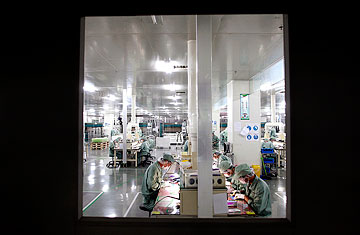
Light show Assembling photovoltaic panels in Wuxi. China's solar-power industry, the world's biggest, is generating excess capacity
(3 of 3)
Indeed, China's solar industry is vastly overbuilt. No one is certain how many solar-cell makers are operating in China today, but there are hundreds. Though some of the more advanced companies like Suntech have pushed down costs and improved the efficiency of cells, most of China's panelmakers don't have any technological advantages or special know-how. Dennis She, CEO of ET Solar, one of the more successful Chinese solar companies, says some local investors "don't even know how the industry works before they get into it." Global excess capacity, in China and elsewhere, caused panel prices to plummet by half in 2011, threatening many Chinese firms with extinction. "Some have already disappeared," says She. "There will not be more than 10 key players in China that will survive in the next three years."
Wanted: A New Model
To make sure its miracle continues, China's government must ease its grip on the economy. The state control that has served the country so well in the past has become the biggest threat to its future. Prices manipulated by bureaucrats need to be determined by market forces to create the conditions for healthier growth. That includes freeing up interest rates, so that capital is invested more wisely, and the currency, the yuan, so that industry is motivated to upgrade its technology and productivity. Banks have to be transformed from arms of state policy into commercially oriented, risk-sensitive financiers. Protected sectors like finance must be opened up to spur competition. State companies that now gorge on subsidies and other privileges have to be cut loose to make it on their own. All that is an enormous task — but not impossible. After its financial crisis, South Korea cut the links among government, finance and business, forcing companies to become globally competitive, strengthening the banking sector and unleashing a wave of entrepreneurship that spawned new, creative industries.
Such initiatives can help China too. Despite all the excitement over the increasingly wealthy Chinese consumer — the country, for instance, has surpassed the U.S. as the world's biggest car market — private consumption relative to GDP, at about 34%, is among the lowest for any major economy. Boosting consumer spending would rebalance the economy by making it less dependent on investment for growth. To achieve that, Beijing should liberalize interest rates to stop punishing savers and allow them a better return. In parallel, China needs to shore up its health care and pension systems to give the average household the security to spend rather than conserve for an uncertain future.
The case of Wuxi retiree Zheng Xueyan is common. Zheng, 51, and her electrician husband place about 40% of their $600 monthly income into the bank. Any extra cash — like the $17,000 in severance her husband got after being laid off from a previous job — also goes straight into the bank. The problem, says Zheng, is that she is too worried about paying health care bills in her old age to splurge on a car or other luxuries. "We tend to save for future consequences," she says.
The good news is that Beijing has gotten reforms right in the past. The top mandarins recognize that change is essential. In one policy pronouncement after another, including the latest five-year plan, China's leaders have stressed the need to make growth more stable and to improve the lives of average Chinese. "There are structural problems in China's economy that cause unsteady, unbalanced, uncoordinated and unsustainable development," Premier Wen Jiabao has said.
However, Wen and his comrades have done little to back their pledges of reform with action. To tackle the current slowdown, Wen recently proposed trotting out China's usual stimulus technique — more money for more infrastructure. The top brass worries that reform would cause growth to slow in the short term, leading to joblessness and social unrest. Reformers must also contend with entrenched interests, from the bureaucracy to state enterprises. "There are a lot of people with a lot of power who have gotten rich off the current system," says James McGregor, senior counselor at consulting firm APCO Worldwide in Beijing. China "has its own form of gridlock." What's lacking is a bold vision for China's economic future. The Communist Party seems too wary of allowing companies, banks and businesspeople the freedom to take the economy to the next level. Says McGregor: "China's model is stretched as far as it can go." Pray it doesn't snap.
—with reporting by Jessie Jiang / Beijing
